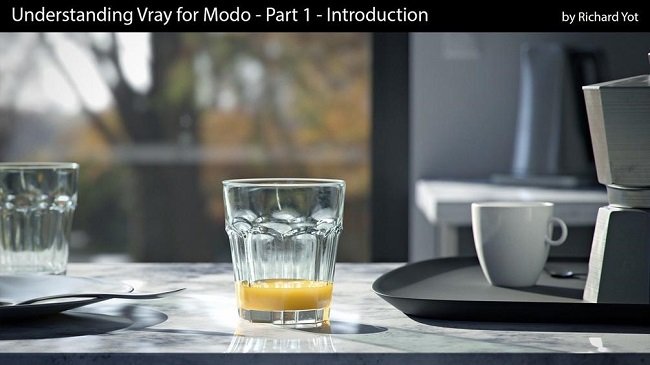
Gumroad – Understanding Vray for Modo – Part 1 and 2
Info:
This introduction to Vray for Modo will help to demystify how to best approach using Vray in Modo, particularly when it comes to creating materials and what render settings to use.
If you are familiar with Modo’s shading system you might find it difficult to translate some of the concepts and settings to Vray because Vray’s shaders work a little differently, especially when it comes to fresnel reflections. This can make translating Modo materials to Vray difficult if you don’t clearly understand those differences. This tutorial will help you master how to go about creating realistic and physically accurate materials in Vray.
In Vray there are several options for sub-surface scattering, ranging from the regular Vray material to the SSS2 material as well as the AlSurface shader. All of these are compared and explored.
Particular attention is paid to the creation of metals, because these can be quite difficult to create accurately in Vray due to the way the fresnel property on the Vray material is implemented. The tutorial will demonstrate the most straightforward way of creating physically accurate metals in Vray that correspond with real-world values.
Render settings are also explained in detail, and the most efficient approach to creating reliably fast renders is shown. Vray’s superior GI engine is explained and the significant speed advantage against the native Modo render engine is demonstrated. The tutorial covers both CPU and GPU rendering in Vray, and the final scene can be rendered with both methods – with the GPU render being twice as fast as the CPU render on regular hardware.
Whether you are on the fence and trying to decide if Vray is a good addition to Modo, or if you are a seasoned Vray veteran, this tutorial will clearly explain the workings of the shading and rendering aspects of Vray, and explores issues which are not covered in other tutorials, with original research revealing little-known aspects of Vray. So take the guesswork out of using Vray with this Introduction to Vray for Modo.
This second instalment of the Vray for Modo training will help to demystify how to best approach using Vray in Modo, particularly when it comes to creating materials and what render settings to use.
In this training you will go into more in-depth material creation, using both the Shader Tree and the Schematic view. The creation of coated materials using the Schematic is demonstrated, giving a good understanding of Vray’s Blend Material. There are step-by-step examples demonstrating how to create a layered material using Vray’s own procedural textures, and a practical example of Vray’s Tri-Planar projection in use. These techniques will allow you to quickly build complex shaders using Vray native materials and textures, with a range of options that are powerful and flexible.
There is also a video about displacement, which explains how to get the most detail out of your displacement maps as well as discussing some of the options available in Vray, and when to use them. Additional videos take a look at Vray Proxies and Portals.
Finally there are some real-world examples of interior renders using both HDR images and Area Lights for lighting, with strategies to get the fastest possible render times using either option to light your scenes.
As an additional bonus there is a selection of 20 free materials included, these have been created specifically for this training and there will also be some bonus videos added to show how some of these materials were created.
Password/解压密码0daydown
Download rapidgator
https://rg.to/file/cab3e66153a1c1c6a0f94acd75fc47f2/GumroadUnderstandingVrayforModoPart1and2.part1.rar.html
https://rg.to/file/88935a983b592db8b916c1515e083184/GumroadUnderstandingVrayforModoPart1and2.part2.rar.html
Download nitroflare
https://nitroflare.com/view/5D546E22D501241/GumroadUnderstandingVrayforModoPart1and2.part1.rar
https://nitroflare.com/view/382C27BA5008F44/GumroadUnderstandingVrayforModoPart1and2.part2.rar
转载请注明:0daytown » Gumroad – Understanding Vray for Modo – Part 1 and 2